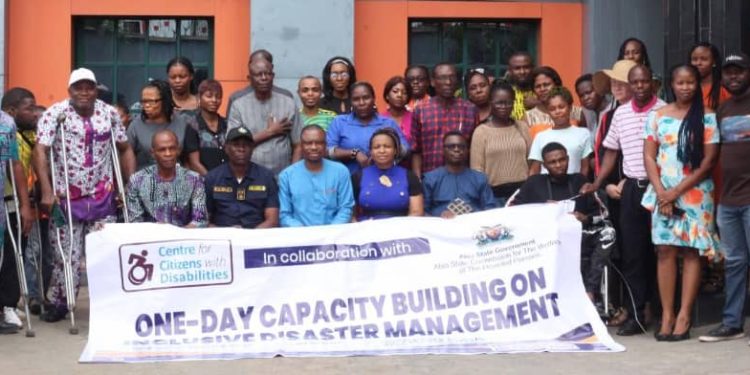The Abia State Commission for the Welfare of Disabled Persons has reaffirmed its commitment to strengthening the capacity of disaster management responders to ensure that persons with disabilities (PWDs) are not left behind during emergency situations.
The commission’s chairman, Mr. David Anyaele, made this known at a one-day capacity-building workshop on disability-inclusive disaster management, held in Aba.
The event, organised by the Centre for Citizens with Disabilities (CCD) in collaboration with the commission and supported by the Disability Rights Fund, aimed to enhance the preparedness of emergency responders and climate change personnel.
Anyaele emphasized the need for inclusive disaster response mechanisms, noting that disasters do not discriminate based on ability or disability.
As the Special Assistant to the Governor on Persons with Disabilities, Anyaele praised Governor Alex Otti for his dedication to disability inclusion, citing his recent directive “to make all public infrastructure, including parking spaces, accessible to Persons With Disabilities”.
The Acting Director of CCD, Mr. Godwin Unumeri, highlighted the importance of proper identification and communication when assisting PWDs during disasters.
He expressed the need for the first responders to first identify the PWDs and types of disability, when disasters occured, so as to determine their response to them.
“In managing PWDs in disaster situations, many don’t understand that there are things they need to do around communicating effectively to get the PWDs ready for evacuation,” he said.
Dr. Queensley Chukwudum, a Senior Lecturer at the University of Uyo, who was a resource person at the training, harped on the role of collaboration in inclusive disaster management. She delivered presentations on “Integrating Disability-Inclusion in Climate Change and Emergency Preparedness” and “Key Principles and Best Practices in Disability-Inclusive Disaster Management.”
Mr. Chris Ike, Director of Climate Change at the Ministry of Environment, reiterated the government’s intent to design climate policies with PWDs in mind.
He noted that PWDs are often the most vulnerable during disasters, hence, the need to prioritise their safety and inclusion in emergency planning and response efforts.
Ike assured that PWDs will be actively involved in climate-related initiatives throughout the year.
The workshop brought together key stakeholders, including the State Fire Service, State Emergency Management Agency, Ministries of Environment and Health, civil society organizations, and heads of PWD clusters, to foster collaboration on inclusive disaster response strategies.

